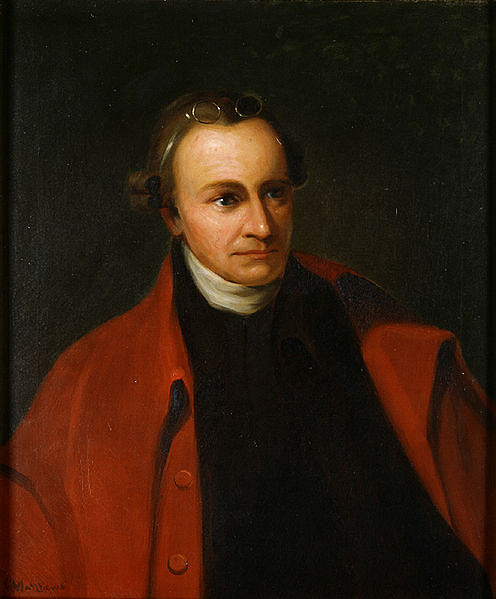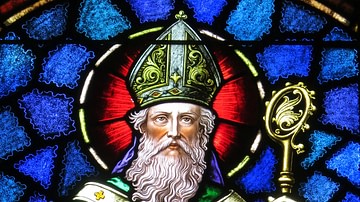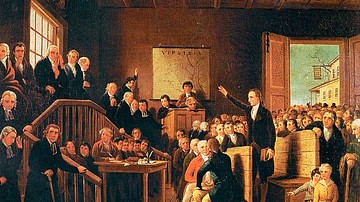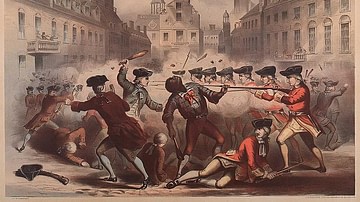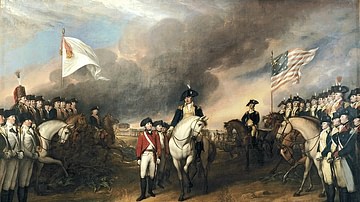"Give me liberty or give me death!” is the closing line from a speech made by Patrick Henry to the Second Virginia Convention on 23 March 1775, in which he argued that war with Britain was inevitable and a militia should be raised to defend American liberties. It is among the most famous speeches of the American Revolution (c. 1765-1789).

In his speech, Henry asserted that the time for reasoning with Britain has passed; in many instances during the previous decade, he argued, the colonies had expressed their grievances to both the British Parliament and King George III of Great Britain (r. 1760-1820), but their voices had been ignored. Henry went on to claim that the British had already provoked a war by sending soldiers and warships to Boston and other colonial towns. Since Britain had no major enemies in North America after defeating France in the French and Indian War (1754-1763), Henry concluded that the only purpose that Britain would have for sending large numbers of soldiers to the colonies was to suppress the Americans' liberties. The only recourse, then, was for Virginia to raise a militia for its own defense. Henry's speech convinced the moderates of the Convention that war was inevitable, and a militia was duly raised. Less than a month later, Henry's warnings rang true when British soldiers clashed with Massachusetts militiamen at the Battles of Lexington and Concord (19 April 1775), beginning the American Revolutionary War (1775-1783). Henry's speech enhanced his reputation and helped him become the first governor of the Commonwealth of Virginia after the independence of the United States in July 1776.
However, the authenticity of the text of the speech has been questioned in recent decades; Henry's exact words were not recorded until 1817, more than 40 years after they had been uttered. William Wirt, Henry's first biographer, reconstructed the speech by interviewing eyewitnesses and consulting secondary sources, leading many modern historians to doubt if all the words attributed to Henry were really his. In either case, the speech has become an iconic part of American history and expresses the feelings of Henry and many other American Patriots in the months leading up to the Revolutionary War. Wirt's reconstruction certainly captures the essence of Henry's original speech, if not the actual words, and therefore still deserves to be looked at alongside the other important speeches and documents of the American revolutionary era.
Context
By the time Patrick Henry (1736-1799) delivered his most famous speech to the Second Virginia Convention, the quarrel between Great Britain and its thirteen North American colonies was already a decade old. Beginning in 1764, the British Parliament imposed a series of direct taxes on the Thirteen Colonies to help pay off the debt the British Empire had incurred during the recent Seven Years' War (1756-1763). These tax policies, which included the Sugar Act (1764), Stamp Act (1765), and Townshend Acts (1767-1768), were vehemently resisted by many American colonists, who believed them to be unconstitutional. According to the colonial argument, the Americans were tied to the British Empire through their fealty to the king but owed no loyalty to Parliament, a legislative body in which they were not represented. Furthermore, the Americans contended that despite having crossed over to the New World, they still enjoyed the rights of Englishmen, which were guaranteed in the British constitution and enshrined in their own colonial charters. These included the right to self-taxation, leading the Americans to argue that they could only be taxed by their own colonial governments, not by the British Parliament.
Patrick Henry became one of the most outspoken proponents of the argument against Parliamentary taxes. Indeed, even before the issue of 'taxation without representation' became a widespread colonial concern, Henry was defending the colonies' rights to make their own tax laws without British interference. On 1 December 1763, in a famous legal case known as the Parson's Cause, Henry argued that the king had no authority to overturn the Two Penny Act, a tax policy that had been passed by Virginia's House of Burgesses before being vetoed by the king's Privy Council. Henry contended that by interfering with the will of his subjects, the king had neglected his duties and was no longer fit to rule; such inflammatory rhetoric earned him shouts of 'treason' from the Loyalists in the courtroom but won him the support of the colony's Patriots, who elected him to the House of Burgesses in 1765. In this position, Henry spearheaded the passage of the Virginia Resolves, in which the colony affirmed the constitutional rights of its citizens and denied Parliament's authority to pass the Stamp Act.

As Henry's reputation as a Patriot grew, relations between Britain and the colonies continued to deteriorate. In 1774, in response to the destruction of East India Company tea during the Boston Tea Party, Parliament passed the Intolerable Acts, which aimed to punish the town of Boston by closing its port to commerce, installing a military governor, and garrisoning Boston with British soldiers, among other things. As Massachusetts militia prepared for a potential conflict with British troops, the House of Burgesses announced Virginia's support for its sister colony, leading to the House's dissolution by the governor, Lord Dunmore. The Virginia Conventions met in place of the House of Burgesses, with the Second Convention meeting in Richmond at St. John's Episcopal Church on 20 March 1775. At the meeting, Henry proposed the raising of a Virginia militia independent of royal authority, arguing that war with Britain was, at this point, inevitable and that Virginia had to be ready. On 23 March, during the debate over Henry's proposals, he delivered his "Liberty or Death" speech, arguing that war was necessary for the defense of American liberties.
The Speech
Mr. President: No man thinks more highly than I do of the patriotism, as well as abilities, of the very worthy gentlemen who have just addressed the House. But different men often see the same subject in different lights; and, therefore, I hope it will not be thought disrespectful to those gentlemen if, entertaining as I do opinions of a character very opposite to theirs, I shall speak forth my sentiments freely and without reserve. This is no time for ceremony. The question before the House is one of awful moment to this country. For my own part, I consider it as nothing less than a question of freedom or slavery; and in proportion to the magnitude of the subject ought to be the freedom of the debate. It is only in this way that we can hope to arrive at truth, and fulfill the great responsibility which we hold to God and our country. Should I keep back my opinions at such a time, through fear of giving offense, I should consider myself as guilty of treason towards my country, and of an act of disloyalty toward the Majesty of Heaven, which I revere above all earthly kings.
Mr. President, it is natural to man to indulge in the illusions of hope. We are apt to shut our eyes against a painful truth, and listen to the song of that siren till she transforms us into beasts. Is this the part of wise men, engaged in a great and arduous struggle for liberty? Are we disposed to be of the number of those who, having eyes, see not, and, having ears, hear not, the things which so nearly concern their temporal salvation? For my part, whatever anguish of spirit it may cost, I am willing to know the whole truth; to know the worst, and to provide for it.
I have but one lamp by which my feet are guided, and that is the lamp of experience. I know of no way of judging of the future but by the past. And judging by the past, I wish to know what there has been in the conduct of the British ministry for the last ten years to justify those hopes with which gentlemen have been pleased to solace themselves and the House. Is it that insidious smile with which our petition has been lately received? Trust it not, sir; it will prove a snare to your feet. Suffer not yourselves to be betrayed with a kiss. Ask yourselves how this gracious reception of our petition comports with those warlike preparations which cover our waters and darken our land. Are fleets and armies necessary to a work of love and reconciliation? Have we shown ourselves so unwilling to be reconciled that force must be called in to win back our love? Let us not deceive ourselves, sir. These are the implements of war and subjugation; the last arguments to which kings resort.
I ask gentlemen, sir, what means this martial array, if its purpose be not to force us to submission? Can gentlemen assign any other possible motive for it? Has Great Britain any enemy, in this quarter of the world, to call for all this accumulation of navies and armies? No, sir, she has none. They are meant for us: they can be meant for no other. They are sent over to bind and rivet upon us those chains which the British ministry have been so long forging. And what have we to oppose to them? Shall we try argument? Sir, we have been trying that for the last ten years. Have we anything new to offer upon the subject? Nothing. We have held the subject up in every light of which it is capable; but it has been all in vain. Shall we resort to entreaty and humble supplication? What terms shall we find which have not been already exhausted? Let us not, I beseech you, sir, deceive ourselves.
Sir, we have done everything that could be done to avert the storm which is now coming on. We have petitioned; we have remonstrated; we have supplicated; we have prostrated ourselves before the throne, and have implored its interposition to arrest the tyrannical hands of the ministry and Parliament. Our petitions have been slighted; our remonstrances have produced additional violence and insult; our supplications have been disregarded; and we have been spurned, with contempt, from the foot of the throne! In vain, after these things, may we indulge the fond hope of peace and reconciliation. There is no longer any room for hope. If we wish to be free – if we mean to preserve inviolate those inestimable privileges for which we have been so long contending – if we mean not basely to abandon the noble struggle in which we have been so long engaged, and which we have pledged ourselves never to abandon until the glorious object of our contest shall be obtained–we must fight! I repeat it, sir, we must fight! An appeal to arms and to the God of hosts is all that is left us!
They tell us, sir, that we are weak; unable to cope with so formidable an adversary. But when shall we be stronger? Will it be the next week, or the next year? Will it be when we are totally disarmed, and when a British guard shall be stationed in every house? Shall we gather strength by irresolution and inaction? Shall we acquire the means of effectual resistance by lying supinely on our backs and hugging the delusive phantom of hope, until our enemies shall have bound us hand and foot? Sir, we are not weak if we make a proper use of those means which the God of nature hath placed in our power. The millions of people, armed in the holy cause of liberty, and in such a country as that which we possess, are invincible by any force which our enemy can send against us. Besides, sir, we shall not fight our battles alone. There is a just God who presides over the destinies of nations, and who will raise up friends to fight our battles for us. The battle, sir, is not to the strong alone; it is to the vigilant, the active, the brave. Besides, sir, we have no election. If we were base enough to desire it, it is now too late to retire from the contest. There is no retreat but in submission and slavery! Our chains are forged! Their clanking may be heard on the plains of Boston! The war is inevitable – and let it come! I repeat it, sir, let it come.
It is in vain, sir, to extenuate the matter. Gentlemen may cry, 'Peace, Peace'– but there is no peace. The war is actually begun! The next gale that sweeps from the north will bring to our ears the clash of resounding arms! Our brethren are already in the field! Why stand we here idle? What is it that gentlemen wish? What would they have? Is life so dear, or peace so sweet, as to be purchased at the price of chains and slavery? Forbid it, Almighty God! I know not what course others may take; but as for me, give me liberty or give me death!
(Campbell, 128-130; Colonial Williamsburg; Avolon Project).
Effects & Legacy
Henry's speech had a profound effect on his listeners, who sat in contemplative silence for several minutes after Henry had finished speaking. George Washington, who was in attendance, listened to Henry's speech with a look on his face that "bespoke a mind in meditation on his country's fate” while another listener, Colonel Edward Carrington, was so moved by Henry's eloquence that he asked to be buried at that church; Carrington's request was honored when he died 35 years later (Campbell, 131). Henry's speech ultimately persuaded the Convention that action had to be taken, and a committee was set up to oversee the colony's defense; Henry was appointed the chairman of the committee, which included Washington, Thomas Jefferson, Richard Henry Lee, and others.
The speech proved to be a timely one. Lord Dunmore, governor of Virginia, had become alarmed by the militant attitudes of the Virginian Patriots and decided to seize the gunpowder magazine in Williamsburg before it could fall into the hands of Henry's newly raised militia. On 20 April 1775, Dunmore sent British soldiers to seize the magazine, which sparked outrage across the colony. In response, Henry personally led a small group of his militia to Williamsburg, resulting in a standoff between Dunmore's troops and the Virginian militia. Violence was avoided when Dunmore paid Henry £330 in compensation for the 'stolen' gunpowder, bringing the so-called Gunpowder Incident to an end; however, blood had already been spilled in Massachusetts, where the Battles of Lexington and Concord had been fought the day before, beginning the American Revolutionary War (1775-1783). Fearing for his safety, Dunmore evacuated the colony aboard a Royal Navy ship. After the United States declared its independence in July 1776, Patrick Henry became the first governor of the Commonwealth of Virginia.
Today, the phrase 'give me liberty or give me death' remains one of the most famous to come out of the American Revolution. In the two centuries since its utterance, it has been quoted by many politicians and activists and used as a slogan in several revolutionary and political movements.
Publication & Question of Authenticity
The full text of Henry's speech was not printed until 1817, 42 years after it had been delivered. It was printed in Sketches of the Life and Character of Patrick Henry, the first biography of Henry, written by William Wirt. Wirt set about reconstructing the speech by speaking with any surviving eyewitnesses he could find, as well as by consulting several second-hand sources that contained fragments of Henry's speech. Wirt took most of the text from Judge St. George Tucker, who had been present at the speech and claimed to have written it down shortly afterward.
From the publication of Wirt's biography until the 1970s, the text of the speech was usually accepted as accurate. However, some recent scholars have begun to question how much artistic liberty Wirt took in reconstructing Henry's words, with some even doubting whether Henry actually said the famous "give me liberty or give me death” line. But whether the words were Henry's, Wirt's, or someone else's, the phrase certainly sums up both Henry's main points as well as the attitudes of many colonists in the leadup to the Revolutionary War.

